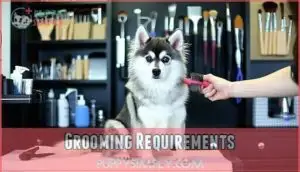This site is supported by our readers. We may earn a commission, at no cost to you, if you purchase through links.
 Picture yourself opening your home to a Pointer, an energetic hunting companion with a keen nose and a heart of gold.
Picture yourself opening your home to a Pointer, an energetic hunting companion with a keen nose and a heart of gold.
Imagine the joy of sharing your life with this quintessential athlete, known for its unwavering loyalty and boundless enthusiasm.
Their spirited nature may require extra attention, training, and exercise, but the rewards are immeasurable.
Are you ready to embark on this extraordinary journey with a Pointer by your side?
Table Of Contents
Key Takeaways
- Require consistent training, socialization, exercise, and mental stimulation to prevent destructive behaviors
- Form strong bonds with families when properly cared for
- Prone to hip dysplasia, eye disease, and thyroid problems – require regular vet checkups
- Patience and assertive training methods lead to success
Pointer Personality
Describing a pointer’s personality starts with acknowledging their boundless energy and enthusiasm for life.
As high-energy companions bred for hunting and field work, pointers thrive when their zesty spirits are engaged through regular exercise, training adventures, and interactive play.
Without adequate outlets, their trademark eagerness can manifest in overexcitable behavior.
When properly stimulated, however, their affectionate temperaments endear them to families.
Pointers form close bonds with their people, craving attention and affection.
Their energetic personalities require conscientious owners able to provide consistency, patience, and plenty of outlets for their enthusiasm.
With appropriate care tailored to their breed characteristics, pointers make lively, loyal additions eager to share in life’s exciting adventures.
Are Pointers Good Family Dogs?
As devoted companions, pointers form strong bonds with their families.
However, their energetic nature and exercise needs require some consideration regarding household compatibility.
Proper socialization and training from puppyhood is key for pointers to thrive in a family environment.
Utilizing positive reinforcement, establish house rules around acceptable behaviors.
Provide ample outdoor access for playtime and physical outlets to prevent destructive tendencies.
Monitor interactions with small children, guiding gentle manners and supervised play.
While exuberant, with conscientious training and activity management, pointers can flourish with thoughtful owners committed to their enrichment.
Establishing structure through routine exercise and training facilitates reduced reactivity.
Pointer Exercise Needs
Two of the keys to living happily with your energetic pointer are providing them with plenty of daily exercise and mental stimulation to meet their high activity levels.
As a breed bred to hunt all day in the field, pointers need more than just a daily walk.
Plan outdoor adventures like hiking, running, swimming, or playing fetch to tap into your pointer’s athleticism and endurance.
Rotate different vigorous exercise varieties to keep their canine fitness level peaked.
You’ll also need to incorporate playful challenges and mental stimulation.
Without an outlet for their enthusiasm and intelligence, pointers are prone to destructive or hyper behaviors.
With the proper amount of physical and mental exercise every day, your lively pointer will be a pleasant and affectionate companion.
Training a Pointer
When it comes to training your Pointer, you’ll want to start socialization and obedience training early on if you expect to have a well-mannered adult dog.
Here are some key training tips:
- Introduce your puppy to new people, dogs, places, and experiences frequently to promote good social skills.
- Use positive reinforcement techniques and be consistent with commands.
- Work on basic obedience commands like sit, stay, come, and heel early and often.
- Provide plenty of exercise and mental stimulation to prevent destructive behaviors.
- Practice patience as Pointers can be strong-willed; stay calm and assertive.
Early socialization and consistent, rewards-based training will set you up for success with your energetic Pointer. Their intelligence makes them highly trainable, but they need structure and activity to thrive as companions.
Pointer Health Issues
Your Pointer’s health can be affected by several common issues:
- Hip dysplasia
- Eye diseases
- Thyroid problems
As their vet, I aim to catch these early.
Annual exams allow me to screen for:
- Hip and elbow dysplasia
- Eye issues like progressive retinal atrophy
- Thyroid dysfunction
Staying vigilant with at-home care protects your pup too.
- Brush frequently to distribute skin oils and remove debris.
- Check ears and paws for inflammation.
- Schedule regular dental cleanings to prevent bacteria-laden tartar buildup.
Working together, we can keep your energetic companion happy and healthy for years of adventures ahead.
Through understanding your Pointer’s health needs and belonging to a community of responsible pet owners, you’ll feel the freedom of a guilt-free conscience, knowing you’ve done right by your loyal friend.
Grooming Requirements
Their minimal grooming needs make pointers easy to care for in your home.
These smart dogs boast sleek, close coats requiring little more than a weekly once-over with a rubber brush to banish dirt and loose hair.
Be attentive to ear cleanliness, checking and gently wiping weekly with a soft, damp cloth, watching for any signs of infection.
Trim nails regularly to prevent overgrowth and injury.
Establish a dental care routine to promote your pointer’s long-term health, brushing a couple times per week with a toothbrush and toothpaste formulated specifically for canines.
With their short coats and modest grooming requirements, pointers make wonderfully low-maintenance companions.
Embrace the weekly brushing tips, ear checks, nail trims, and dental care routines essential to keeping your beloved pointer looking and feeling its best through every season’s adventures.
Pointer Living Conditions
You’ll usually need to provide this breed with a securely fenced backyard where they can run around and play frequently.
As high-energy hunting dogs bred to range far distances, pointers need plenty of daily exercise and mental stimulation.
These dogs thrive best with access to a large, fenced yard where they can expend their energy.
Make sure to establish a consistent daily routine with activities like long walks, playing fetch, or training.
Well-exercised pointers that have an outlet for their energy make for wonderful companions.
However, without proper socialization and outlets for their exercise needs, they may develop problem behaviors like excessive barking or destructive chewing.
With the right living conditions that meet their needs, pointers can flourish in an environment that provides freedom.
What to Feed a Pointer
As energetic hunters, you’ll want to feed your Pointer a high-protein diet that matches their activity level.
Consider their dietary preferences and nutritional needs when choosing dog food or making homemade meals.
A balanced nutrition plan supports muscle development, weight management, and overall health.
Some Pointer owners choose raw diets due to perceived digestive and dental health benefits, but consult your vet.
Ultimately, tailor the diet to your dog’s age, health status, and lifestyle.
An active hunting companion requires different nutrition than a lightly active house pet.
Monitor your Pointer’s weight and energy, adjusting food accordingly.
Feeding the proper diet fuels their enthusiasm for the hunt while preventing obesity from inactivity during off-seasons.
How Long Do Pointers Live?
Pointers typically have an average lifespan of 12 to 15 years, making them long-term companions for active families.
Genetics play a role, with some lines living longer than others. Discuss health histories with your breeder.
Provide proper preventative care and nutrition to support your pointer’s health. Annual vet checks help catch issues early.
Keep your aging pointer active and fit within their capabilities. Moderate exercise remains important.
Make adjustments to accommodate senior dogs, like orthopedic beds, ramps, or altered feeding schedules.
Finding a Responsible Breeder
Getting a pointer puppy from a responsible breeder sets up both you and your new dog for success.
Carefully research and evaluate potential breeders—ask for customer references and confirm they perform health screenings.
Reputable breeders make an effort to understand your lifestyle and needs to help match you with the right pup.
They offer post-purchase training guidance and support as their pups transition to new homes.
Before committing, reflect on your budget, activity level, and living situation to determine if a pointer is the best fit.
An ideal home provides plenty of exercise and training to channel their high energy.
While the upfront cost can be high when working with responsible breeders, it helps ensure your pointer puppy grows into a happy, healthy companion.
Frequently Asked Questions (FAQs)
Are pointers good with other pets like cats?
Pointers can do well with cats if properly socialized from a young age.
However, their high prey drive means cats should never be left unattended, as chasing or harming them remains an inherent risk.
Careful supervision and training are essential for safe coexistence.
How much does a pointer puppy cost?
When welcoming a pointer puppy into your life, consider not just the initial cost,
but the lifelong investment in their health, training, and well-being.
Are you ready for this unwavering commitment?
What are some common pointer mixes/crossbreeds?
Labrador and pointer mixes tend to be friendly, energetic dogs that require plenty of exercise.
They make great hunting companions or active family pets if properly trained and socialized.
Consider adopting a mix from a shelter or rescue group.
Do pointers make good service or therapy dogs?
Pointers can make great service dogs due to their intelligence and eagerness to please.
However, their high energy may be better suited for roles like search and rescue rather than guiding the blind.
Their friendly nature allows them to thrive as therapy dogs, providing affection and comfort to those in need.
Are pointers easy to potty train?
Pointers can be quick to potty train with consistency, positive reinforcement, and frequent opportunities outside.
However, their high energy and distractibility mean extra diligence is required.
Keep sessions brief and upbeat, praise and treat successes, and confine unsupervised access until fully reliable.
Work cooperatively, not through scolding, to instill good habits from the start.
Conclusion
Like a treasured heirloom passed down generations, a Pointer will be your most loyal companion if given ample space to stretch their legs.
Their boundless energy mirrors their unwavering devotion – be prepared for an adventurous life with this hardwired hunting dog by your side.
Accept the responsibility, and a Pointer’s temperament will reward you with a profoundly fulfilling friendship.
















